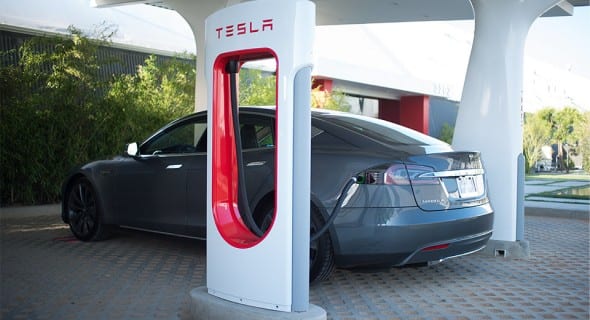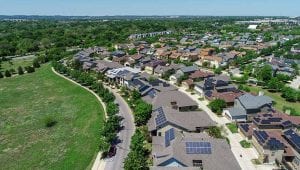Last week, Tesla Motors revealed it would begin charging new Tesla EV drivers a “small fee” to use its network of Superchargers, a change it said would be used to fund an expansion of that network.
This week, the Californian EV maker is already making good on that promise in Australia, with the announcement of three new Supercharging stations along Australia’s south and east coasts; two between Sydney and Brisbane and one between Melbourne and Adelaide.

In an update published on Friday, Tesla said it had begun construction on two new six-bay Supercharger stations, one at Motto Farm in Heatherbrae in NSW and one at Macadamia Castle in Knockrow, south of Brisbane.
The first, at Motto Farm, was chosen by the company as a “first stop” for Tesla drivers en route from Sydney to Brisbane. Located on the Pacific Highway, the Supercharger station will be co-located with an on-site café, bar and motel, which are set to open in the coming months.
The six-bay Supercharger station at Macadamia Castle – a popular tourist spot south of Brisbane – was chosen as a final stop on the Sydney to Brisbane route, and also offers drivers access to a café and fine food store.
Tesla said works will soon begin on a further six-bay Supercharger station at a shopping centre in Wendouree, near Ballarat – as a first stop for tips between Melbourne and Adelaide.
To recap, Tesla’s Superchargers can add up to 270km of range in just 30 minutes of charging, and while they have been used by inner-city Tesla drivers for fast, free top-ups, they are designed for city to city travel.
Tesla’s Supercharger networks are designed to allow for about three hours of driving time, in-between half-hour recharging stops.
The service, which in Australia has been limited to just a handful of locations, has also been free for all Tesla owners. But for customers whose Teslas are ordered after January 1 2017, no such luck. These Tesla drivers will get a maximum of 400kWh Supercharging credits per annum, and will thereafter have to pay an as yet unspecified fee to use the Superchargers.
Musk said of the new Supercharger fee that it would allows Tesla “to reinvest in the network, accelerate its growth and bring all owners, current and future, the best Supercharging experience.”
As Wired magazine noted, “this isn’t Tesla giving up on its promises or Elon turning Ebenezer. This is Tesla growing up – along with the American electric vehicle industry.”
Meanwhile, Tesla has rejected claims published in a Herald Sun story on Friday that a Tesla EV had been driven across Melbourne illegally in full autopilot mode.
The News Ltd article reported that Victoria’s roads minister, Luke Donnellan, had been told of someone using an automated Tesla vehicle from one side of the city to the other.
“The use of this is still illegal even though they were in the car,” Donnellan was quoted as saying, adding that “if you get picked up you’ll be punished, and you’ll probably even be on the front page of the Herald Sun.”
Tesla – which is fiercely protective of its public image – responded immediately, issuing a release describing the information as factually incorrect, and requesting an update to the article. They also spoke to the minister, who allowed that he was never made aware of the make of the vehicle concerned.
But that’s not all the News Ltd story got wrong: “Tesla does not have any fully autonomous vehicles in the Australian market or on any road in the world,” the EV maker’s statement said. “While Tesla is currently producing all of its vehicles with full-self driving hardware, Tesla has not yet introduced any software or features that make its vehicles self-driving.”










